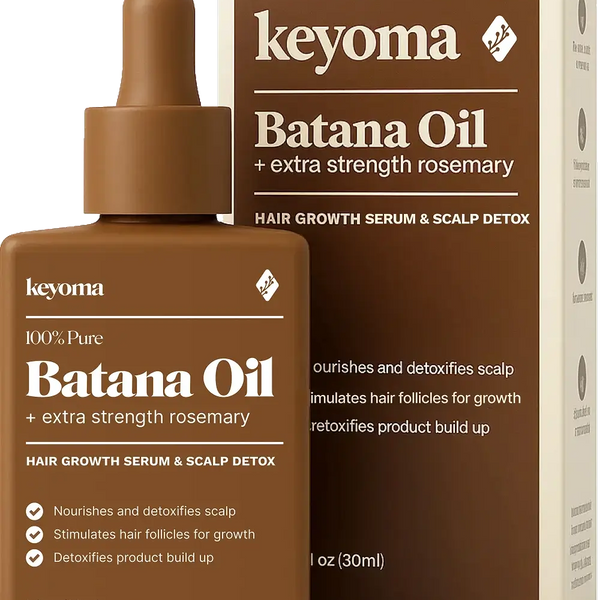Last updated
Aug 29, 2025
Castor Oil vs Coconut Oil for Hair and Skin: What Works
Published on
Aug 29, 2025

In this article
Castor oil vs coconut oil is a matchup of two ultra-versatile staples. Both shine for skin and hair, yet coconut tends to suit skin needs best while castor often performs better for hair concerns. Keep reading to see where each oil excels and how to use them.
Key Takeaways
-
Castor and coconut oils support hair health, addressing moisture, breakage, and scalp balance.
-
Castor oil contains ricinoleic acid, hydrates, reduces breakage, and may encourage growth.
-
Coconut oil absorbs into hair, fights fungi, reduces protein loss, and protects against heat damage.
-
Blending both oils can strengthen hair, apply to damp hair and rinse thoroughly.
What Is Castor Oil
Castor oil comes from the castor bean and you can apply it to your scalp to support hair growth. More research is needed, but it contains ricinoleic acid, a fatty acid noted for its ability to calm inflammation.
Castor oil may also promote overall hair health. It can moisturize and nourish strands and help protect your scalp and hair shaft from bacterial and fungal issues.
Benefits of Castor Oil for Hair
Research points to ricinoleic acid and other fatty acids, amino acids, flavonoids, vitamin E, and minerals as key components behind castor oil’s hair benefits. Here’s how to use it for growth and overall hair health.

Enhance Hair Texture
Like coconut oil for hair, castor oil can leave hair smoother and shinier, and it can help with detangling.
Reduce Hair Breakage
Castor oil’s hydrating, nourishing qualities can help you avoid breakage and damage. Its fatty acids penetrate well and may provide a soothing, strengthening effect at the follicles.
Hydrate Hair
Research shows fatty acids in castor oil, especially ricinoleic acid, make it a strong hair and scalp moisturizer. As a humectant, it helps hydrate follicles and may prevent breakage. I noticed a few drops spread best on damp hair and felt lighter. Working it through strands reduces dryness, and massaging into the scalp improves dandruff and eases itchiness or irritation.
Support Hair Growth
Studies suggest ricinoleic acid in castor oil may treat hair loss in men by balancing prostaglandin D2 (PGD2), which influences hair growth.
Castor oil may also boost circulation to follicles, which can support growth. For the same reason, some people apply it to eyebrows.
What Is Coconut Oil?
Coconut oil is produced by pressing fresh or dried coconut meat, the white flesh inside a coconut. Virgin coconut oil uses fresh meat, while refined versions usually start with dried meat, also called copra.
Benefits of Coconut Oil
Coconut oil is used topically to moisturize the scalp, limit dandruff, and support hair growth. Research suggests it might also offer antifungal benefits for people dealing with dandruff.

Help Fight Fungal Infections
Healthy hair starts at the scalp. Keeping your scalp balanced may help your hair grow better.
One recent lab study found that coconut oil helped eliminate certain types of fungal infections.
Coconut oil may help manage or prevent dandruff and other scalp fungi. More research is needed to confirm the same skin and scalp effects.
Soothe Scalp Irritation
Coconut oil is a natural saturated fat. Its high fat content may soothe scalp irritation, flaking, and itching, and those lipids can also help lock in moisture.
Protect From Heat Damage
Using a small amount of coconut oil on wet hair before blow-drying or heat styling may help protect against water and heat damage.
Hygral fatigue happens when hair swells from excess water. Too much swelling can weaken the hair or cause breakage, leaving it drier over time.
Help Treat Split Ends
A review in 2015 reported that coconut oil absorbs into hair better than mineral oil and some other oils. This may help limit breakage and split ends.
Because of this, you might need fewer trims if you use coconut oil consistently, which can make hair seem like it grows longer, faster.
Another review on coconut oil use in India notes that it may reduce protein loss in hair. That helps prevent dryness, brittleness, and breakage. In India, it is used both as a hair mask before showering and as a leave-in after.
Can Castor Oil and Coconut Oil Work Together?
Both castor and coconut oils are often praised for rescuing dry hair. Each contains fatty acids that are thought to support growth.
Coconut oil is easily absorbed into the hair, so strands can take up its fatty acids more readily.
For castor oil, there is limited scientific evidence for direct growth effects. Like coconut oil, its fatty acids aid in moisturizing skin, which supports your scalp, and scalp health is tied to hair health. While a healthy scalp is not proven to trigger growth, it can reduce breakage and shedding.
Each oil plays a role in overall hair care, so pairing them may help keep hair strong and healthy.
How to Mix Castor Oil and Coconut Oil
Blending castor oil with coconut oil is simple and effective. Follow these steps to get the most from both:
-
Mixing: If solid, gently melt a little coconut oil. Combine equal parts castor and melted coconut oil in a bowl. Adjust the ratio to fit your preference and hair’s needs.
-
Application: Apply the blend to clean, damp hair. Start at the roots and move to the ends for even coverage. For extra benefit, massage the oils into your scalp to encourage circulation.
-
Duration: Leave the mixture on for at least 20 minutes. For deeper conditioning, leave it overnight and protect your pillow with a bamboo pillowcase.
-
Rinsing: Wash thoroughly with a gentle shampoo to remove the oils. You may need two washes to clear any residue.
Blend Safely, Patch-Test, and Track Results With Keyoma
Castor and coconut oils belong in your toolkit, but match them to your goals. Use castor oil for deeper conditioning; choose coconut oil when you want absorption that may help limit protein loss and calm a flaky scalp. You can blend them and adjust as your hair responds.
Start with a small amount, patch test, and apply as a pre-shampoo massage or a light finish on damp lengths; wash well to avoid residue and pause if irritation develops. For ongoing ideas and gentle routines, follow Keyoma’s blog and social media for more hair care tips.
Featured Product
100% Pure Batana Oil + Rosemary
Learn more about Batana Oil
Your Cart
Your Cart is empty
Let's fix that
You might like...
Search our store








